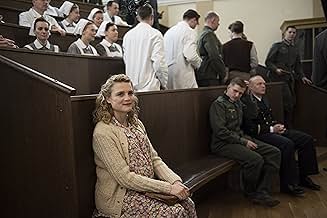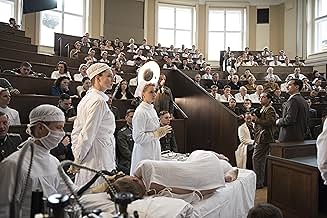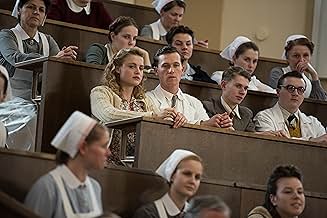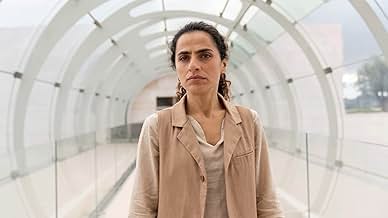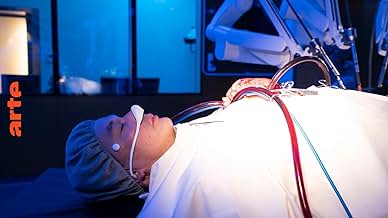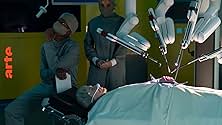VALUTAZIONE IMDb
7,8/10
3902
LA TUA VALUTAZIONE
La vita dei scienziati del secolo 18 e poi.La vita dei scienziati del secolo 18 e poi.La vita dei scienziati del secolo 18 e poi.
- Premi
- 3 vittorie e 7 candidature totali
Sfoglia gli episodi
Trama
Lo sapevi?
- QuizSeason 3 takes place in Berlin, summer 1961.
- ConnessioniReferenced in Riverboat - Die MDR-Talkshow aus Leipzig: Folge vom 15. Februar 2019 (2019)
Recensione in evidenza
"Charite at War" covers the German hospital during World War II.
The film focuses on Anni (Mala Emde), her doctor husband Arthur (Artjom Gilz), the brilliant surgeon Sauerbruch, and Anni's brother (Otto Jannik Schumann), an in-the-closet gay. Given Rule 175, homosexuals who were caught were arrested and worse.
The group at the hospital reflects the differing views of citizens under Hitler's restrictions, some of whom display delusional thinking. Artur works with disabled children who are wards of the state as he works to develop a new vaccine. These children are eventually sent to another hospital, where Artur believes the children receive treatment, though the truth is, they are exterminated.
Sauerbruch goes along with Hitler's restrictions, but he believes he has a duty to all patients, and that includes Jews. He himself spoke to the Minister of Justice to end the extermination of children - and believes it is no longer happening.
Anni is a would-be doctor studying with Sauerbruch. Anni is comfortable that she and Artur have the correct genes. However, their new baby, Karin, possibly has hydrocephalus. This means she has to be reported and transferred, and that they may be sterilized. Instead, they treat the baby at home and then appeal to Sauerbruch for help. She and Artur face a crisis in their beliefs and in their marriage.
Otto falls in love with a male attendant at the hospital. There is a young nurse after him, who presses him for a commitment before he leaves for the service. When she doesn't get it, trouble ensues.
A cruel doctor accuses soldiers in the infirmary of faking their illness or wounded themselves, and they are sent for execution.
Meanwhile Germany is losing the war, and everyone hopes it will be over soon. Nobody seems to like Hitler. Sauerbruch thinks he's crazy. But they all live with terror.
Toward the end of the film, we see what Hitler sent out to fight - teenage boys. Pathetic.
An interesting cross-section of those who are secret spies and just plain keeping secrets as they try to get through their lives and survive Hitler.
"Charite at War" is depressing, and we see how the German people suffered. Toward the end of the war, there was no water, no supplies at the hospital, nothing, as doctors use liquor to sterilize their hands and anesthetize the patients.
And that's what happens when someone tells you that some people are superior to others, and anything that goes wrong with the country is the fault of these lesser people.
I'd say never forget, but it seems as though we have.
The film focuses on Anni (Mala Emde), her doctor husband Arthur (Artjom Gilz), the brilliant surgeon Sauerbruch, and Anni's brother (Otto Jannik Schumann), an in-the-closet gay. Given Rule 175, homosexuals who were caught were arrested and worse.
The group at the hospital reflects the differing views of citizens under Hitler's restrictions, some of whom display delusional thinking. Artur works with disabled children who are wards of the state as he works to develop a new vaccine. These children are eventually sent to another hospital, where Artur believes the children receive treatment, though the truth is, they are exterminated.
Sauerbruch goes along with Hitler's restrictions, but he believes he has a duty to all patients, and that includes Jews. He himself spoke to the Minister of Justice to end the extermination of children - and believes it is no longer happening.
Anni is a would-be doctor studying with Sauerbruch. Anni is comfortable that she and Artur have the correct genes. However, their new baby, Karin, possibly has hydrocephalus. This means she has to be reported and transferred, and that they may be sterilized. Instead, they treat the baby at home and then appeal to Sauerbruch for help. She and Artur face a crisis in their beliefs and in their marriage.
Otto falls in love with a male attendant at the hospital. There is a young nurse after him, who presses him for a commitment before he leaves for the service. When she doesn't get it, trouble ensues.
A cruel doctor accuses soldiers in the infirmary of faking their illness or wounded themselves, and they are sent for execution.
Meanwhile Germany is losing the war, and everyone hopes it will be over soon. Nobody seems to like Hitler. Sauerbruch thinks he's crazy. But they all live with terror.
Toward the end of the film, we see what Hitler sent out to fight - teenage boys. Pathetic.
An interesting cross-section of those who are secret spies and just plain keeping secrets as they try to get through their lives and survive Hitler.
"Charite at War" is depressing, and we see how the German people suffered. Toward the end of the war, there was no water, no supplies at the hospital, nothing, as doctors use liquor to sterilize their hands and anesthetize the patients.
And that's what happens when someone tells you that some people are superior to others, and anything that goes wrong with the country is the fault of these lesser people.
I'd say never forget, but it seems as though we have.
I più visti
Accedi per valutare e creare un elenco di titoli salvati per ottenere consigli personalizzati
- How many seasons does Charité have?Powered by Alexa
Dettagli
Contribuisci a questa pagina
Suggerisci una modifica o aggiungi i contenuti mancanti


![Guarda Trailer Staffel 2 [OV]](https://m.media-amazon.com/images/M/MV5BNWU0YWE0YjMtNDZjYy00ODk3LWE1NWItMjkwOTE0NTA5MDA4XkEyXkFqcGdeQXRyYW5zY29kZS13b3JrZmxvdw@@._V1_QL75_UX500_CR0)
